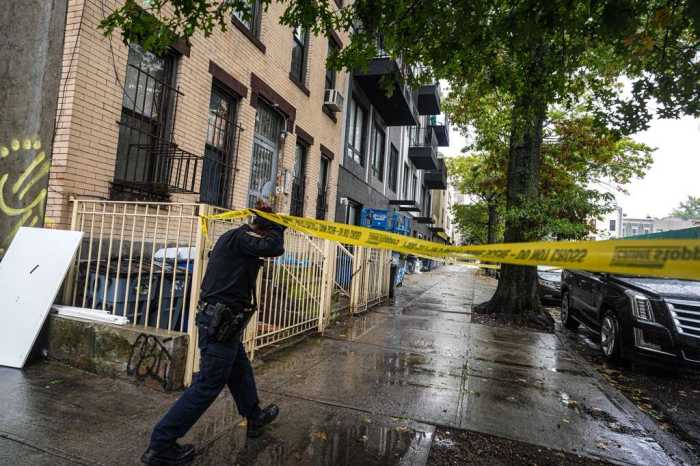BY BONNIE ROSENSTOCK | On January 19, the Chelsea Hotel tenants association returned to Housing Court for the next round of their case against Chelsea Dynasty LLC, the Chetrit Group, Chelsea Management LLC, Joseph and Meyer Chetrit, Michael Butler and Lilly Sirkin.
Representing the tenants association were Janet Ray Kalson and Ron Languedoc of Himmelstein, McConnell, Gribben, Donoghue & Joseph. Of the 35 tenants named in the Order to Show Cause, eight attended the proceedings.
Fred Daniels of Daniels, Norelli, Scully and Cecere PC — a firm that specializes in debt collection — represented the respondents-owners. Butler, an executive with the Chetrit Group and named in the lawsuit, sat on the opposite side of the courtroom from the tenants. Valentine Moretti was the legal counsel for the Department of Housing Preservation & Development (HPD), the city agency also named as respondent. HPD appears at each housing court case to represent tenants in general, explained Mary Anne Rose, one of the tenants. “It’s less critical if tenants already have representation, but since there are so many violations at the hotel, it behooves him to deal with these,” Rose said.
At the December 16 hearing, Judge Peter Wendt stipulated that the owners adhere to a tenant safety plan and follow applicable laws and regulations regarding construction and demolition — and provide heat and hot water to residents of the renowned West 23rd Street hotel. At the January 19 hearing, Judge Wendt asked a series of questions following up on these issues. Both sides concurred that at present there was adequate heat and hot water, with Daniels noting that the landlord is going to inspect and confirm repair issues along the way. Moretti said he doubted HPD had trained people for mold inspection; Daniels stated that the owners want to participate in obtaining a cost estimate for mold remediation as a means of comparison and within the next two weeks they will pick a contractor.
The judge adjourned the case until February 14, at which time Kalson told Chelsea Now, “We are going to have an agreement or very close to it, or we are going to set up for a trial.” Any ruling (whether from an agreement or from the outcome of a trial) is only enforceable among petitioners. “Someone who is not named in the lawsuit doesn’t have the right to come in and say we didn’t notify you,” Languedoc explained.
“The judge reminded all sides that a trial is an expensive enterprise — and time consuming,” said Zoe Pappas, a spokesperson for the tenants association. “It’s not beneficial for the landlord to keep this lawsuit forever. It will work against him.” Rose added that it isn’t to his advantage “to have a hotel filled with mold.” The hotel has been closed to the public since demolition and construction began in September — but 100 or so tenants still reside there.
After the adjournment, as Butler and Daniels were passing through the hallway towards the elevators, Chelsea Now asked Daniels for a statement about the day’s proceedings. He excused himself, and moved off to the side to consult with Butler. When they came back, Daniels requested this reporter’s business card and said Chetrit’s press office would be in contact. When asked for a statement, Butler said, “No comment,” and he entered the elevator, along with Daniels.
Kalson explained there were two goals on this day. One related to notification. “The good news is that we have an order that tenants have to be notified of any construction 72 hours in advance,” she said. “That is something we had talked to the landlord’s attorney about and brought it up again in court.” Daniels stated before the judge that right now, there was no major demolition going on.
But the most important goal was to ascertain if the landlord and tenants could come to an agreement to have a competent contractor remediate the mold. “We want to get the mold done and done right, pursuant to New York City Department of Health guidelines,” said Kalson. “This is the hardest issue in this case because mold remediation is more complicated than getting other repairs made. If we can remediate this, we should be able to come to an agreement on fixing all the other conditions in the apartments, such as peeling paint and plaster and run of the mill stuff.”
When the Chetrit Group, et al. closed on the hotel on August 1, 2011, they bought it with all its defects — which they are responsible for repairing. “Given the lack of rehabilitation and proper maintenance, we have always had spit and polish and a little Scotch Tape maintenance,” said Rose.
On January 12, the landlord and his contractor were given access to the 14 apartments that the HPD form said had mold. Olmstead Environmental Services, the company hired by the tenants, returned on January 16 to retest those same apartments. The company originally tested for complaints of dampness, water leaks, mold growth and dust as well as other safety and health hazards related to the demolition work and issued a comprehensive report on November 2, 2011.
“Ed Olmstead found mold everywhere he did before and didn’t find it where he didn’t find it before,” said Pappas. The owners’ contractor’s report and the January 16 Olmstead findings will be compared by both parties.
Pappas told Chelsea Now, “For the first time today [on January 19],” Butler volunteered to her that his contractor found mold, too.
Kalson, however, is unhappy they had to adjourn the case again. “I certainly don’t want to adjourn it endlessly,” she said. “In the meantime, the owners are going to come up with a third name for a contractor, give it to us and we will run it by Olmstead, who has submitted two names, and let the landlords know whether or not we think their contractor is acceptable.”
The owners had already proposed two contractors that were unacceptable. “If mold remediation is done properly, it is eliminated. A bad contractor ends up screwing up the mold, and then it comes back and becomes worse,” Kalson said.
Chelsea Hotel resident Faye Lane has first-hand knowledge of inadequate mold abatement. Her apartment was flooded due to construction on the floor above, as water leaked through the ceiling for a number of days. There was damage everywhere, and no effort was made by the construction contractor or the landlord to dry the apartment. “This apartment has heavy water damage and mold growth and is uninhabitable,” concluded the November 2 Olmstead report.
Lane, a 20-year resident of the hotel, has been displaced by the toxic, carcinogenic mold and is without her belongings — which were contaminated by mold spores from the original mold and from Chelsea Dynasty’s previous “remediation,” done without regard to EPA or New York State mold remediation guidelines.
She works as a flight attendant, but is better known as the writer/performer of the 2011 New York Fringe Festival favorite, “Faye Lane’s Beauty Shop Stories.” She is staying in Astoria, Queens, which has made her commute to the airport difficult. More importantly, she can’t access her contaminated book notes and has missed two deadlines with her literary agent. Her show is on hiatus from SoHo Playhouse, where Lane has been offered another year’s residency beginning at any time — but due in part to ill health and the contamination of props and costumes used in the show, she lost her prestigious Friday night time slot to another production.
Lane has asthma as a result of the mold. Although her breathing has improved since leaving the apartment (she no longer uses an inhaler), Lane is still hoarse and unable to sing — and has been advised to see an environmental physician specializing in mold.
Lane is a member of the Chelsea Hotel tenants association. However, she is not part of the current litigation because she commenced her own lawsuit, which was settled on January 20, before the group was formed on October 7, 2011.
But not everyone is on board with the association, even though they are experiencing the same environmental hazards and threat of eviction. Rose noted that, “Some people are just too busy doing their art. Also, there are such different personalities here, and not everyone knows each other.” As a case in point, Rose said that just last week they got a new member, whose name appeared on the case. “I didn’t even know who she was,” Rose admitted. “But it’s a miracle that we have been able to collectively build what we have. It would be a nightmare if people had to go to court independently.”
Evictions are on a case-by-case basis. There is litigation about whether people are rent stabilized, which thus far, the landlord has been unable to prove. There is also litigation stemming from refusal to accept checks, especially if the tenant is living with somebody. Currently, the owners will only accept checks from the tenant they acknowledge, and then start an eviction proceeding while warehousing the paid rent. This was the case with an elderly couple, longtime residents of the hotel. They received an eviction notice on November 7 because the landlord wouldn’t accept checks not signed by the woman. (Owners retained their rent checks for September 15 and October 15, 2011, which they cashed on November 28.)
“We realized they would be out on the street before Christmas,” said Pappas. So members of the association donated money and hired Kalson, who worked at cost. The case was settled in the tenants’ favor. “We are an association but also dealing with emergency situations that have to be addressed,” said Rose.
The day after the hearing, Chelsea Now called Daniels’ office to ask him if he now had a statement regarding the proceedings. He replied that he gave this reporter’s personal business card to Butler, who was going to pass it on to the main office, and that any statement would come directly from the owners. Daniels said he would contact Butler and remind him. “If he doesn’t contact you, that is his statement and mine, too,” said Daniels. As of publication, there has been no statement forthcoming.
Recently, however, the owners have been issuing statements about creating an Artist in Residence Program and making the hotel an art destination again. “The new people running the hotel don’t seem to understand the difference between entertainment and creativity,” said tenant Judith Childs, widow of artist Bernard Childs. “The nurturing atmosphere for creativity is what the place has always been.”
As for the “artist in residence,” Lane declared, “They are actively evicting artists already in residence. I just want to live in my home and create art.”
For more information, visit chelseanow.com and search for “Chelsea Hotel residents air grievances.”


































